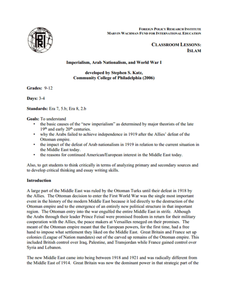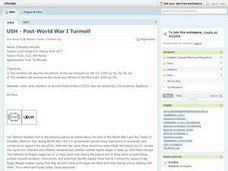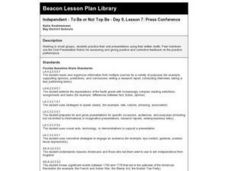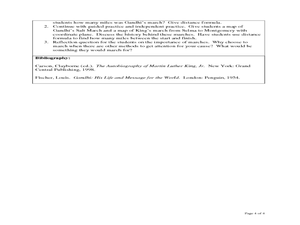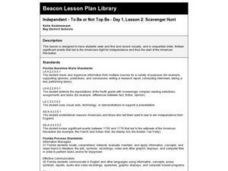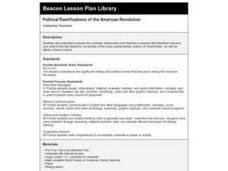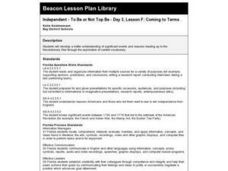Foreign Policy Research Institute
Imperialism, Arab Nationalism and World War I
Continued conflict in the Middle East makes this lesson relevant, and the inclusion of a critique of Lawrence of Arabia might increase student interest in a potentially challenging topic. The resource includes a solid...
Curated OER
Road to Revolution
Students discuss reasons war erupted between Britain and the colonies. They examine and explain critical events of the 1760s, and discuss what rights and beliefs Americans felt were being violated.
Curated OER
1th Grade U.S. History from 1877
Eleventh graders engage in a lesson that is about the study of history in the United States after the end of World War I. They conduct research using a variety of resources and then summaries are written to explain the reasons for The...
Curated OER
Independent - To Be or Not Top Be: Press Conference
Fourth graders deliver an oral presentation on the American war for independence to small groups. They use a rubric to give each other peer feedback on the strengths and weaknesses of their presentation.
Curated OER
The Distance Formula and Marching Nonviolently for Social Change
Students explore the distance formula using real world data from nonviolent marches for social change. For this secondary mathematics lesson, students investigate the marches of Gandhi and King using maps overlaid with a coordinate...
Curated OER
The Battle of the Battlefields
Middle schoolers simulate the role of a presidential analysis group to research a location for a Revolutionary War museum. They conduct research, and write a summary of their findings to present to the President.
Curated OER
Revolutions in Latin America (19c - Early 20c)
The history of the Latin American revolutions - and the philosophies behind them - is the focus of this comprehensive presentation. From the theories of the European Enlightenment, to the Revolutionary Wars of America and France, Latin...
City University of New York
The Split Over Suffrage
Compare and contrast Frederick Douglass's and the National Women's Suffrage Association's stances on equal rights and suffrage with a series of documents and worksheets. Learners work together or independently to complete the packet, and...
Curated OER
VS.5a
Fifth graders explore, examine and identify the reasons why the colonies went to war with England as expressed in the Declaration of Independence. They discover the conflicts that developed between the colonies and England over how the...
Curated OER
The End of United States' Occupation of Japan
Ninth graders examine and discuss reasons for end of U.S. occupation of Japan in 1952, locate surrounding Asian countries on map, explore changes to Japan after World War II, and discuss how changes in Japan impacted other countries.
Curated OER
Korean And Vietnam Conflicts: Similarities And Differences
Eighth graders study the historical significance of the Korean and Vietnam Wars in this unit of study. They investigate the different ideologies that were involved and examine the effect of the wars on local veterans.
Curated OER
Betty Mae Jumper and The Second Seminole War
Fifth graders describe the reasons for, nature of, and outcomes of the Second Seminole War. They determine that Seminole women and men faced many hardships as they fought for their survival. They relate a story of a Seminole "first"...
Curated OER
Independent - To Be or Not Top Be: Say It Again, Uncle Sam
Fourth graders revise and edit an oral presentation on the American Revolution based on peer feedback. They refine their oral presentation style and pinpoint areas in need of improvement.
Curated OER
Simulation: Revolutionary Town Hall Meeting
Secondary historians simulate events leading up to the American Revolution. They assume the roles of patriots, loyalists, or neutrals in a town meeting set prior to the Revolution. As Patriots and Loyalists make their arguments, neutrals...
Curated OER
Independent - To Be or Not Top Be - Day 1, Lesson 2: Scavenger Hunt
Fifth graders research the thirteen significant events that lead to the start of the American Revolution.
Curated OER
Trade Wars: the Candidates Take a Stand
Students research topics related to trade, and develop a graphic organizer. They debate and discuss topics related to trade.
Curated OER
Political Ramifications of the American Revolution
Students, in groups, research a topic from the Revolutionary War. They present their research to the class as a review and the instructor summarizes important information. They take a test on the presented topics.
Curated OER
We The People: A History
Students play a game about taxation where they have tax collectors that simulate the feelings and reasons that led to the American Revolution. In this taxation lesson plan, students learn about why the people in the colonies were so...
Curated OER
Understanding History, Religion, and Politics in Jerusalem and Beyond
Students examine the reasons behind the Israeli-Palestinian conflict. Exploring multiple perspectives, they discuss the concepts of peoples' rights and justice in the area. They practice applying conflict resolution principles as well.
Curated OER
To Join or not to Join the League of Nations - That is the Question
Students evaluate the possible reasons the United States did not become part of the League of Nations. In this World History lesson, students discuss the pros and cons of what might have happened if the United States had joined the...
Curated OER
Independent - To Be or Not Top Be - Day 2, Lesson E: In My Opinion . . .
Fifth graders read paragraphs that they've written from a Mountains to Climb self-reflection worksheet.
Curated OER
Independent - To Be or Not Top Be - Day 3, Lesson F: Coming to Terms
Fifth graders develop vocabulary through the study of the American Revolution.
Curated OER
Analyzing Sources on Imperialism
Ninth graders explore the concept of imperialism. In this imperialism lesson, 9th graders analyze primary sources regarding British imperialism in Africa. Students analyze the sources for credibility as they gain an understanding of the...
Curated OER
Give Peace A Chance: Nonviolence as a valid strategy for social change
Students analyze how people solve conflicts. In this conflict resolution lesson, students look at Mahatma Gandhi and Martin Luther King's nonviolence movements. They see the reasoning behind nonviolence and how it works.
